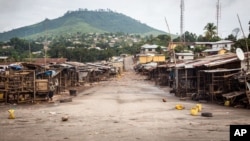The streets of Freetown, Sierra Leone's capital, resembled a ghost town Saturday as the nation entered the second day of a three-day lockdown to combat the deadly Ebola.
The virus has killed more than 2,600 across West Africa and affected more than 5,000 people.
In Sierra Leone, more than 560 people have died of Ebola and there are more than 1,000 confirmed cases.
Tens of thousands of health workers are going door to door in the West African country of 6 million, informing people of how to avoid Ebola, handing out soap and asking suspected Ebola patients to come to treatment centers.
'Extraordinary times'
President Ernest Bai Koroma has appealed to all Sierra Leoneans to stay home all three days, saying in a televised address that "extraordinary times require extraordinary measures."
Critics say the exercise could be chaotic and ineffective.
Momoh Kamara of Freetown is concerned about how Ebola has affected his people and said he is doing what he can for prevention.
“Presently I have hand wash sanitizer, whenever the kids go out, I ask them to use the hand wash,"Kamara said.
Teams consisting of a health worker, an NGO worker and a community volunteer are going door to door across the country.
Kamara said the three-day lockdown is a good idea because people need more education about the disease.
And as the rain poured down, he patiently waited in his home with his four children for experts to come by and talk to him.
“We have to take precautions and whenever we take precaution, when the head of state ask us to stay at home, I think is better for us, so we can get more attention about this virus," he said.
The teams will also look for new cases of Ebola.
Information campaign
Nyka Alexander, spokesperson for the World Health Organization in Freetown, said the goal is actually not to find cases, although it’s likely cases will be found.
The teams will inform people with suspected infections about what they should do, but will not force anyone to do those things.
The regional anti-Ebola effort has been hampered by widespread fears and misinformation about the disease.
Officials say a group of young people attacked health workers trying to bury bodies of Ebola victims near Freetown on Saturday. The attackers dispersed after police reinforcements arrived to protect the burial team.
In neighboring Guinea, villagers in a remote southeastern region killed eight people who were part of a delegation to raise awareness about Ebola.
Authorities have arrested at least six people in connection with the attack, which happened Tuesday in the village of Wome.
A government spokesman told VOA that some people believe Ebola does not exist, or that the delegation came to kill people.
WHO spokesperson Alexander added that the teams are also leaving stickers on people's doors with messages and slogans, such as “avoid body contact.”
“There’s three different stickers with three different messages, so the idea is neighbors will say, ‘Oh, you have a sticker, what does your's say?’ and that will help community talk about Ebola more," she said.
The stay-at-home campaign will run until September 21. After that the community workers will continue doing their work to try to stop the further spread of Ebola.
UN response center
Meanwhile, the United Nations has established the U.N. Mission for Ebola Emergency Response, or UNMEER, headquartered in Ghana.
U.N. Secretary-General Ban Ki-moon said UNMEER will provide the operational framework "to treat the infected, to ensure essential services, to preserve stability and to prevent the spread to countries currently unaffected."
Ban said the mission will rely on the support of the entire U.N. system, "in particular the critical technical expertise of the World Health Organization," and will work closely with member states, regional organizations, civil society and the private sector.
VIDEO: Fears Ebola Outbreak ‘Beyond Our Capability to Contain’












